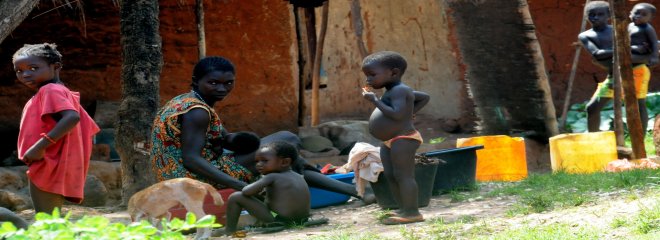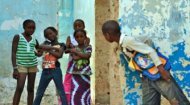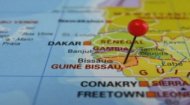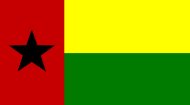|
Vieira introduced economic and political reforms, however was effectively a dictator taking little truck from political rivalries and not tolerating dissent. His rule saw numerous unsuccessful coup attempts, however in 1994 he stood as a candidate in Guinea-Bissau's first free elections and was successful. An army mutiny in 1998 was followed by the toppling of Vieira the following year and in 2000 Kumba Yala was elected president, however his behaviour was considered erratic and, after a number of senior government sackings, Kumba Yala was ousted in a further military coup in 2003 which installed an interim civilian administration headed by President Henrique Rosa with the promise of democratic elections.
Geographically, Guinea-Bissau is a compact nation characterised by a low-lying coastal plain, extensive mangrove swamps, and a vast archipelago of over 88 islands, the Bijagós Islands, a UNESCO Biosphere Reserve. Its tropical climate features a distinct wet season (June to November) and dry season (December to May). The country is relatively small in land area, but its maritime territory is substantial. Demographically, Guinea-Bissau is home to a diverse array of ethnic groups, each contributing to the nation's cultural mosaic. The largest groups include the Balanta, Fula, Manjaco, Mandinka, Papel, and Bijagós. While Portuguese is the official language, Kriol (a Portuguese-based creole) is widely spoken and understood, serving as a lingua franca that bridges the various ethnic languages. This linguistic diversity reflects the intricate intermingling of traditions and identities across the nation. The economic profile of Guinea-Bissau is largely agrarian, with over 80% of its population engaged in subsistence farming. The backbone of its economy is agriculture, particularly the production and export of cashew nuts, which account for a significant portion of its foreign exchange earnings. Fishing is another vital sector, contributing significantly to livelihoods, especially in coastal communities. Despite these resources, Guinea-Bissau remains one of the poorest countries in the world with Guinea-Bissau is in 179th place out of 193 countries and territories in 2025 when ranked in terms of life expectancy, literacy, access to knowledge and the living standards of a country. Several factors contribute to this challenging economic situation, including its heavy reliance on a single cash crop, vulnerability to climate change, limited infrastructure, and most notably, persistent political instability that deters foreign investment and undermines effective resource management. The country also faces challenges related to inadequate energy supply, poor transportation networks, and a large informal sector. While there is potential in offshore oil, bauxite, and phosphate reserves, these remain largely untapped, awaiting a more stable and conducive environment for exploration and exploitation. |
Guinea-Bissau Profile |
Guinea-Bissau Profile |
Guinea-Bissau Profile | Guinea-Bissau Profile |

|
The social profile of Guinea-Bissau is characterised by strong community ties and family-centric values. However, the nation faces severe social development challenges. Access to basic services such as healthcare, education, and clean water remains limited, especially in rural areas. Infant and child mortality rates are high, and its life expectancy of 64.08yrs is among the lowest globally. While primary school enrollment has improved, educational attainment often lags due to insufficient funding, a shortage of qualified teachers, and poor infrastructure. Poverty is widespread, impacting nearly two-thirds of the population, leading to issues of food insecurity and malnutrition. Furthermore, Guinea-Bissau has faced the unenviable reputation as a transit hub for drug trafficking, a problem that exacerbates corruption, undermines governance, and further strains its fragile social and economic structures. In fact, Guinea-Bissau has been described as a "narco-state" due to this role as a transit point for cocaine trafficking, with officials sometimes implicated in the trade. Despite these formidable obstacles, the resilience of the Bissau-Guinean people shines through, with strong collective support systems often filling the gaps where state services are insufficient. The cultural heritage of Guinea-Bissau is remarkably rich and diverse, a reflection of its many ethnic groups and their unique traditions. Music and dance are integral to daily life, with the infectious rhythm of gumbe music forming a distinctive part of its national identity. Each ethnic group possesses its own traditional dances, musical instruments, and oral traditions, including storytelling through griots. Festivals play a crucial role in the cultural calendar, with Carnaval being the most prominent and vibrant celebration, drawing participants and spectators from across the country and abroad. Traditional beliefs, often intertwined with Islam and Christianity, are deeply rooted in many communities, influencing ceremonies, rituals, and the interpretation of the world. The Bijagós people, for example, maintain a distinctive matriarchal social structure and preserve ancient initiation rites and spiritual practices. This deep connection to heritage fosters a strong sense of identity and community. For most Bissau-Guineans, daily life presents a blend of challenges and resilience. In urban centres like Bissau, the capital, bustling markets and informal trade dominate the economy. Access to electricity and potable water can be sporadic, necessitating adaptability. Rural life revolves around the agricultural calendar, with communities working together in the fields, relying on traditional farming methods and communal support systems. Family is central, and social gatherings, often accompanied by music and conversation under the shade of a mango tree, are common. Despite the hardships, a spirit of solidarity and an optimistic outlook often prevail. Today Guinea-Bissau, with its population of around 2.25m, stands at a critical juncture. Overcoming the persistent cycle of political instability and addressing the deep-seated economic and social challenges are seen as paramount for sustainable development. Investing in education, healthcare, infrastructure, and diversifying the economy beyond cashews are vital steps, given its relatively low literacy rates. With its abundant natural beauty, particularly the Bijagós Islands' potential for eco-tourism, and the vibrant resilience of its people, Guinea-Bissau holds the promise of a brighter future, provided it can harness its rich resources and foster enduring peace and good governance. However it is massively in debt and reliant on foreign aid.
|

 These elections were held in 2005 and saw the return of former president President Vieira to power with a promise of 'national reconciliation'. The success of that promise can be measured by his assassination in March 2009. Malam Bacai Sanha then ruled Guinea-Bissau as a semi-presidential republic until his death in January 2012. After further turmoil, Jose Mario Vaz served as President of Guinea-Bissau from 23th June 2014 to 27th February 2020. Vaz ran as an independent in the 2019 elections but received only 12% of the vote in the first round and failed to advance to the second round with Umaro Sissoco Embalo assuming the presidency on 27th February 2020. This political instability has inevitablely profoundly impacted Guinea-Bissau's development trajectory, hindering sustained progress and effective governance.
These elections were held in 2005 and saw the return of former president President Vieira to power with a promise of 'national reconciliation'. The success of that promise can be measured by his assassination in March 2009. Malam Bacai Sanha then ruled Guinea-Bissau as a semi-presidential republic until his death in January 2012. After further turmoil, Jose Mario Vaz served as President of Guinea-Bissau from 23th June 2014 to 27th February 2020. Vaz ran as an independent in the 2019 elections but received only 12% of the vote in the first round and failed to advance to the second round with Umaro Sissoco Embalo assuming the presidency on 27th February 2020. This political instability has inevitablely profoundly impacted Guinea-Bissau's development trajectory, hindering sustained progress and effective governance.








